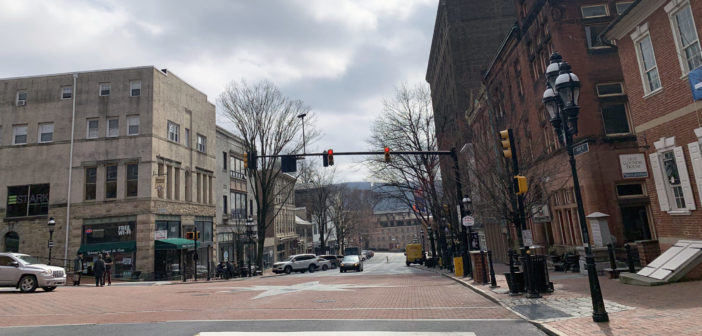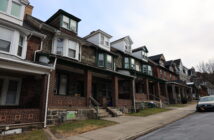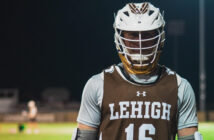Kevin descends the stairs from his apartment on Main Street in North Bethlehem and steps out his front door onto the cold sidewalk below. It’s a blindingly bright day, but the sun bathing the downtown section of the city provides no warmth. He pulls a black winter hat onto his head and walks toward the car a few yards in front.
Diane Dilendik eagerly waits in the driver’s seat. She hasn’t seen Kevin in several weeks. The schedules just didn’t line up. When Kevin climbs in, it’s a reunion. When he enters the car, the energy of the quaint historic Bethlehem on the cusp of the weekend comes with him, too.
“New car?” he asked.
Kevin’s voice is hoarse, and he smiles. Though he doesn’t know what awaits him at his doctor’s appointment in Upper Saucon, he’s safe, warm and comfortable in the car with Dilendik.
Dilendik is a volunteer driver for the Lehigh Valley’s affiliate of the Independent Transportation Network. ITNAmerica is the overhead nonprofit that provides senior citizens like Kevin and blind residents 18 and older with door-to-door transportation within a given region, 24 hours a day, all year long. Clients allowed their first names to be used in this story on the condition of riding with them.
Lehigh Valley’s affiliate began in 2013 under the leadership of Lois Favier, ITNLehighValley’s executive director.
Favier, a Northampton native, said she was working for the Silver Century Foundation in Princeton, New Jersey, when it grew too exhausting to commute to visit her parents in the Lehigh Valley. At the time, her 87-year-old father was caring for her mother, who was suffering from dementia. Favier had heard about ITN, which started in 1995 in Portland, Maine, because the foundation she worked for provided seed money to fund ITN’s national rollout.
The model in Portland had proved successful enough to scale and launch nationwide. In 2010, Favier moved back to the Lehigh Valley to help her parents. At that time, she began raising money — a process that took three years before the affiliate could become operational — to launch ITN in her home area.
Today, ITNLehighValley serves 275 clients, half of whom are 80 years old or older. The staff consists of one full-time operations manager, a part-time dispatcher, 14 volunteer drivers and nine paid part-time drivers.
Clients pay an annual fee to gain access to ITN’s services, and they call the Bethlehem office by 3 p.m. the day before they need a ride to schedule timing and pick up and drop-off locations. Most residents use the service to get to doctor’s appointments, but others request rides to meet friends for lunch, go grocery shopping or get to a bank. The goal, Favier said, is to empower older residents to be able to “age in place.”
“Some of our drivers have been with us for a few years now, and they really become friends (with the clients),” Favier said. “Riders will say, ‘My driver shoveled my walkway for me or took me through the drive-thru at McDonald’s, which was special because I haven’t had a hamburger in six months.’ It’s little things like that, but that makes their day. That driver may be the only one they see this week. … . So we’re it.”
Favier’s experience with her parents’ age and mobility problems, coupled with the Lehigh Valley not having “a lot of transportation options,” motivated her to start this new branch.
Favier said ride-sharing apps like Uber or Lyft typically aren’t effective for ITN’s clientele, considering many aren’t comfortable using smartphones or have vision problems.
“There’s a huge unmet need that so many people don’t realize,” she said.
Dilendik, before starting her morning of volunteering, reads the day’s paper, sprawled out on her dining room table, the smell of coffee wafting through the house. The South Side resident has the radio on. There’s barely a free nook on the table for her to place her breakfast down, with papers, envelopes and mailings scattered about. She says she’s feeling good after her left knee replacement in December.
Dilendik now volunteers five mornings per week and loves the clients. But once upon a time, it was a struggle for Favier to get her on board.
“When she first asked me to do it, I was in the middle of moving from the North Side,” Dilendik said. “But once I finally made the move, I was like, ‘I don’t have any more excuses,’ so I had to say yes. But the people are really nice people. They’re pleased with the service. And I’ve learned some great shortcuts from them.”
After catching up with Kevin, the two were back to their usual banter: how best to get to Kevin’s doctor’s appointment at the St. Luke’s facility near Route 309. As Dilendik crept outward from Bethlehem’s downtown and began down Route 378, the two emerged from the more clustered city life into the part of the Valley that boasts more space between properties and more green.
“I like it here — I like it here a lot,” Kevin said as Dilendik speeds up to keep pace with traffic. “I was in Columbus, Ohio, for 19 years. I finally got homesick, so I sold the house and came back here with my parents to spend their last years with them.”
Karen was Dilendik’s next pick-up. Karen has trouble breathing, among other health problems. She lives in low-incoming housing based at the YMCA in Bethlehem, and she was on her way to a doctor’s appointment she didn’t want to go to.
Plus, she watched the Democratic debate the night before — which didn’t provide any solace.
“(The doctors) came up with 15,000 things that need to be investigated, so that put me in the best mood,” Karen said. “And why do they keep the hallways so dark in these places?”
Regardless of where ride users are going, why they need a ride or the loneliness that can often accompany old age as children move away or spouses pass on, Favier knows the mission of her organization is an essential one in her community.
“They’re so thankful,” she said. “They’re so glad that we’re here, that somebody will come. They have their own personal chauffeur, and it’s kind of like a thrill for them. … They ride in the front seat like they’re riding with a neighbor, with a friend.”






Comment policy
Comments posted to The Brown and White website are reviewed by a moderator before being approved. Incendiary speech or harassing language, including comments targeted at individuals, may be deemed unacceptable and not published. Spam and other soliciting will also be declined.
The Brown and White also reserves the right to not publish entirely anonymous comments.